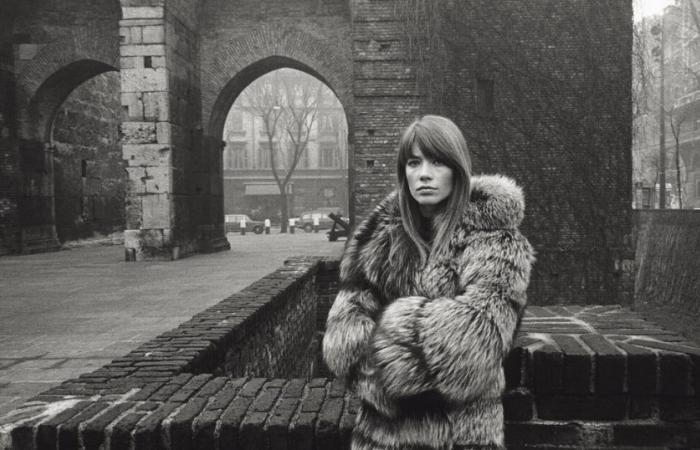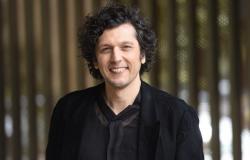It is October 28, 1962, the French watch on television the results of the referendum wanted by De Gaulle which will decide the election of the President of the Republic by universal suffrage. To interrupt the wait for the ballot, clips of musical broadcasts appear. And behold, on a carousel full of wind that lifts the skirts of girls with backcombed hair, an eighteen-year-old Parisian appears, her name is Françoise Hardy, straight brown hair with a large fringe, full lips in her sunken face, a melancholic expression and sulky. She sings a text written by her, Tous les garçons e les filles de mon âge. She complains that boys and girls her age “all have someone to love”, they go hand in hand and make plans for a future together, but she doesn’t, she is “a soul in pain” always alone , and it’s so sad to “be left alone like this”. The yé-yé generation shows her fragile side on a waltz rhythm that has nothing pop about it, but immediately becomes a smash hit, and will soon bounce elsewhere and pop will reinvent it in her way. Moreover, Françoise, who plays the guitar well, has attended good schools and knows languages, will sing that text in German, English, Spanish and Italian with her sweet and innocently seductive voice which is not afraid of appearing romantic and, at least temporarily, defeated on the level of feelings. Because the new woman, capable of shaking off old stereotypes, has already been born and is not ashamed of still having one foot in childhood, another in perpetual adolescence and a head ready to dream all possible dreams, as Susan Sontag taught in Notes on “Camp” from 1964, and by camp he meant “a type of sensitivity that translates into a love of the unnatural, the artificial, the excess”.
The trailblazer had been BB. Simone de Beauvoir had said it in ’60 in the essay Brigitte Bardot and the Lolita syndrome, in which she analyzed the revolutionary nature and natural feminism of the French actress by breaking stereotypes and showing herself excessive, free, even a little cruel towards the other sex. Françoise Hardy, however, is excessive in the opposite sense, natural, shy, certainly childish and what’s more she has the physique of the future, tall and thin like a model, angular in body and character, vaguely androgynous. The year following that lucky song of hers, Mary Quant imposes the miniskirt and she can show it off without problems on two perfect legs, as long as poles, while she also climbs the charts in Italy with another unforgettable song, Le temps de l’amour : “It is the age of love, the age of friends and adventure. The wounds of love last only one evening…”, because “at twenty you are the king of the whole world”. Other times, times in which youth was also seen as a social value, capable of breaking down patterns and imposing new lifestyles. The world really seemed to belong to the young people launched around May ’68, the defeat of the bourgeois mentality of their parents, the war on designer clothes and the conventions of well-being, jeans and a t-shirt are enough, the rent is divided into very disordered “communes ”, you travel for free by hitchhiking. Emotional life becomes a jumble of contradictions, but it doesn’t matter, because the important thing is to fall in love and fall in love and fall in love.
Françoise is not alone in embodying the new femininity that is advancing in show business, dress rehearsals of 70s feminism: there is the very skinny Twiggy, and the brilliant Marianne Faithfull, long a victim of drugs but always capable of reinventing herself, and the splendid model Jean Shrimpton, known as Gamberetto, who will soon, in line with the times, renounce fame and wealth to retire with her photographer husband to manage her own hotel in Cornwall. She and she is still there, regardless of age and with white hair, a splendid eighty-year-old. And the carefree yé-yé queen, Sylvie Vartan, partner of the stormy Johnny Halliday, of Bulgarian origins and adoptive mother of a Bulgarian little girl. Last year, however, another heroine of the new love disorder passed away, Jane Birkin, who after the scandals of her youth had found her serious professional stature as an actress and singer. Françoise Hardy didn’t need scandals. The centrality of love in life and in songs was ultimately reassuring to the public. Men liked her because she didn’t scare them like other much more erotic protagonists, and women because she seemed handy, a schoolmate, easily imitable with that always the same hairstyle, and closer to everyone’s existence due to being constantly defeated in the great fluctuating love with her colleague Jacques Dutronc, a relationship that lasted – and declined in different ways – her entire life.
In short, she had the air of a good girl from a good family, uninterested in destroying other people’s couples, introverted and withdrawn into her personal sentimental pains. Even though many protagonists of pop and rock music of that artistic and seething period fell in love with her, from Bob Dylan to John Lennon, from Mick Jagger to David Bowie, who were very young at the time. It is said that Dylan was so obsessed – he had fallen in love with a photograph, he had never yet met her in person – that he began writing her passionate letters, without ever sending them. She had already exploded with Tous les garçons, he was still making do by playing in clubs. He had moved from Minnesota to New York and went to work in a little bar in the Village where he had studied him, leaving his typewriter on a table. He wrote notes, poems, song lyrics and letters to that French girl who had enchanted him with her melancholy and her sulk, because you don’t need to know each other, when you love, no matter the geographical distance, he wrote, because he understood everything all the same, everything she had in the secret depths of her heart… Then she crumpled up those pages and left them lying around. Luckily the prescient owner of the bar collected all the paperwork and kept… There is one photo, only one, of them together, Bob and Françoise, it was 1966. Dylan plays in Paris, Hardy runs to the concert, but is disappointed: he is so thin that he looks ill, and then he plays very badly, hoarse, incomprehensible. The audience boos him. He gets annoyed, leaves the stage before finishing the evening and retires to the dressing room. So they tell him that Françoise Hardy is in the room and so he sends for her, invites her to a party, but she barely understands that grumpy boy’s English and they stay silent all the time. She follows him, yes, to the suite of her hotel to listen to Just like a Woman and I Want You, but no one knows who sulks the longest, and nothing intimate happens. As seen in the photo: he looks at the ground, she looks into space, disoriented. No, it doesn’t work, and the great love ends there.
Also because Françoise is the type of person with a single overwhelming passion for her whole life, she told it in a book, Crazy Love, which was translated by us for Clichy but is now nowhere to be found. Her ideal man was called Jacques Dutronc, blond, very clear eyes, tormented look, slightly shorter than her. But when she met Dylan she still hadn’t fallen in love with him, because when she met him she found him “ugly” and then she was about to marry someone else, a photographer, Jean-Marie Périer. But it doesn’t last long, it’s a quick marriage and, when she meets Dutronc again, who in the meantime has had success with psychedelic rock and garage rock (he will later become an established actor) the spark strikes. It’s the end of 1967 and while ’68 breaks out in Paris, they go to live their idyll in Corsica. Over time, in ’73, they will have a son, Thomas, now a musician and actor too, and in ’81 they will get married in one of the many ups and downs of the relationship, because Dutronc is one of those restless men who need seductive confirmation and the he constantly cheats (his flirtation with Romy Schneider on the set of the film The important thing is to love, from 1975, is famous). But, precisely, “the important thing is to love” and Françoise forgives him and even when they decide to separate at the end of the 80s, they remain in contact, more than in contact, they spend all the summers together and, in the illness, a cancer that he returns in various forms until he kills her, he is there, he calls her regularly from Corsica, where he has taken root, they see each other and are affectionately next to each other and next to their son. It will be Thomas who announces Françoise Hardy’s passing on June 11th on Instagram: “Maman est partie…”
But what kind of child had she been, what had made her what she later became? She came from a complicated childhood. She was born in times of war, on 17 January 1944 to a woman from a lower middle class family called Madeleine Hardy and had an affair with Pierre Dillard, wealthy, but already married and who paid little attention, even financially, to her second family (after the firstborn, the couple had another daughter, Michèle). Legend has it that on the day of Françoise’s birth, the windows of the clinic shook due to an air alert and the future singer saw in this the distant reason for her “exaggeratedly anxious temperament”. But the situation certainly didn’t help him grow peacefully. The two little girls lived as poor people in a two-room apartment, together with their mother who in the meantime had taken up with an Austrian baron who was also already married. Her father had enrolled them in good schools, but then he forgot to pay her tuition and this caused great shame in his daughters..
It is by chance that Françoise finds her path: one day she listens to singers she likes on the radio, gets a guitar as a gift, takes music lessons, does auditions with Johnny Hallyday which work. And then she explodes, very young, in France and around the world. She is always true to herself. She sings about love, the happiness of a meeting, the difficulty of saying goodbye, without being banal, quiet and distant from her own amazing success. He soon abandons the very tiring concerts. He founded his own record companies, said goodbye to singing several times, but always returned to singing. And in the meantime she cultivates other interests, psychology, astrology, to understand herself first of all, to get to the bottom of the mystery that we are. She is friends with other artists, Jane Birkin in particular, Serge Gainsbourg, George Moustaki.
And in the meantime he writes to slow or rock rhythms: “I’m here, for the cinema, I’m here to go dancing, but don’t count on me to come to you”, or: “As soon as you come to me to whisper a thousand words that I will never understand, it is about love that you make me think, about that love that I dreamed of…”, and also sings The Boy from Via Gluck by Celentano, or shouts to someone who prefers someone else to her: “And yes, I get bored with others, but the only thing I would do is you are with her. But, if you want me, I’m yours again. Darling, look at me and listen: I love you, I love you, I love you!”.
Then, in 2004, the health problems began, that subtle cancer that would torment her for twenty years, because when it seemed overcome, it came back and came back in various forms. She then writes Le large (Taking the Sea, 2018) in pure Hardy style: “In the end, when I set out into the deep, everything will be fine, everything will be far away, give me your hand, I will want nothing but you”. And in the video you can see a child caressing on a screen the face of young Françoise with bangs and straight hair and almost eighty-year-old Françoise with white hair. Always unique, special, beautiful. Someone had claimed that she was the most beautiful woman in the world: she had simply laughed. Because as she had written in another song from 1962, I would like to understand you did not want to be the most beautiful, but not to be forgotten: “All I would like is to remain for you as a memory that you will never, never again be able to forget”. And she probably succeeded.






